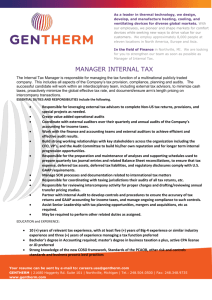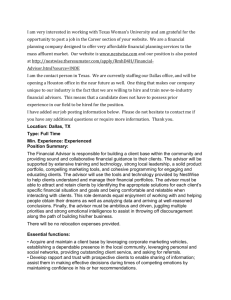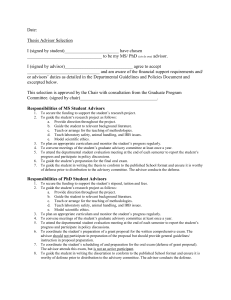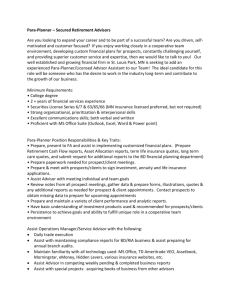IA Switch Help Audit Process
advertisement
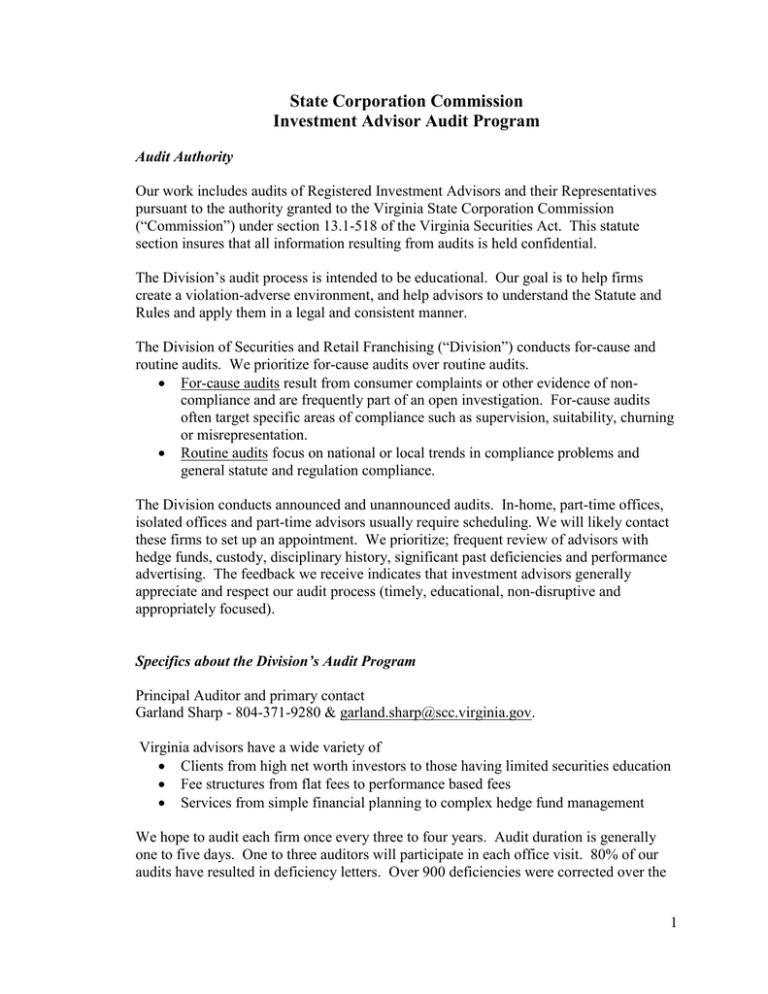
State Corporation Commission Investment Advisor Audit Program Audit Authority Our work includes audits of Registered Investment Advisors and their Representatives pursuant to the authority granted to the Virginia State Corporation Commission (“Commission”) under section 13.1-518 of the Virginia Securities Act. This statute section insures that all information resulting from audits is held confidential. The Division’s audit process is intended to be educational. Our goal is to help firms create a violation-adverse environment, and help advisors to understand the Statute and Rules and apply them in a legal and consistent manner. The Division of Securities and Retail Franchising (“Division”) conducts for-cause and routine audits. We prioritize for-cause audits over routine audits. For-cause audits result from consumer complaints or other evidence of noncompliance and are frequently part of an open investigation. For-cause audits often target specific areas of compliance such as supervision, suitability, churning or misrepresentation. Routine audits focus on national or local trends in compliance problems and general statute and regulation compliance. The Division conducts announced and unannounced audits. In-home, part-time offices, isolated offices and part-time advisors usually require scheduling. We will likely contact these firms to set up an appointment. We prioritize; frequent review of advisors with hedge funds, custody, disciplinary history, significant past deficiencies and performance advertising. The feedback we receive indicates that investment advisors generally appreciate and respect our audit process (timely, educational, non-disruptive and appropriately focused). Specifics about the Division’s Audit Program Principal Auditor and primary contact Garland Sharp - 804-371-9280 & garland.sharp@scc.virginia.gov. Virginia advisors have a wide variety of Clients from high net worth investors to those having limited securities education Fee structures from flat fees to performance based fees Services from simple financial planning to complex hedge fund management We hope to audit each firm once every three to four years. Audit duration is generally one to five days. One to three auditors will participate in each office visit. 80% of our audits have resulted in deficiency letters. Over 900 deficiencies were corrected over the 1 last three years. Less than 5% of our audits have resulted in formal Commission actions. Less than 5% of our audits have been for-cause audits, the rest are routine. What to Expect During an Audit Generally, an examiner will schedule the audit with you a few days to a week in advance. The examiner will provide a preliminary document request list of records and information prior to the audit. The document request list is a comprehensive list of the documents and information that might be available in an advisor’s office. Every advisor will not have every item on the list. You should use the Document Request List to prepare for the meeting. Either have the item available in paper or electronic format. Be prepared to tell us how we can access electronic information. Be prepared to advise why the item(s) does not apply. When we arrive we will conduct a preliminary interview. The more we understand from this preliminary interview, the fewer questions we will ask when we begin to examine documents. Expect on-site interviews of compliance managers, related staff and possibly representatives. Areas covered by the interview include: Asking you to provide contact information for key personnel Types of clientele Supervisory system Types of securities recommended Advisory personnel and staff Broker-Dealer affiliations – Where trades are placed Level of the advisor’s authority Fees and charges Disclosure of customer information Advertising Computer security Types of services offered Employees in the office along with their positions During the examination we will look for comprehensive development of an investment policy statement and insure the firm’s reasonable adherence to that policy. Custody is an important concern, so expect us to track and validate client balances back to all custodian accounts and assure the stated fund amounts are accurate. Inadvertent custody may occur if you use a customer’s user ID and password in your business model. If you use this type of model make sure you only have trading authority and documents to prove you cannot gain access to client funds or full custody provisions may apply. Essentially, the examination is a series of reviews that test whether the advisor is applying our regulations properly. Most tests involve a representative sample while a few items may involve a 100% review, especially if the examiner detects a potential problem. We review some records on-site and others are reviewed off-site (paper and electronic). 2 The following list includes a summary of the areas covered by an Investment Advisor examination: Registration; § 13.1-504 Are the advisor and any staff members who provide investment advice properly registered? Disclosure on Form ADV; Rule 5-80-40 & 100 & 190, ADV Part 1 A & B These are updated on IARD and ADV Part II. Both have to be updated each year if there are any changes. Advisory Agreement; Rules 5-80-160 A 10 & 200 A 16 & §13.1-503 C 1,2, and 3, 13.1522 F Every advisor must have a written advisory agreement. Specific items are required by 503 C & 200 A 16. Solicitors may incorporate advisory agreement into the Solicitors’ Disclosure Statement signed by the client. Hedge Funds may incorporate the advisory agreement into the Subscription Agreement. Supervision; Rule 5-80-170 A, B, C, and D This regulation requires that an investment advisor have supervisory procedures in place if there is more than one representative. Custody; Rule 5-80-145, 5-80-200 A & B 15 See Rule 5-80-145, these requirements are extensive and a must. Advertising; Rule 5-80-160 A 7, 11 and 16, We review all advertising, any letter to two or more persons, any seminar(s) and particularly performance advertising. Verified Global Investment Performance Standards (GIPS) is preferred and is the gold standard from our point of view. Complaints and Litigation; Rule 5-80-160 A 17 All related communication sent or received regarding the event(s). Suitability Information; Rule 5-80-160 A 18 The advisor must maintain written information that forms the basis for their recommendations for each client. An investment Policy Statement and/or client profile is a good idea. Financial planners Does the financial plan provide the level of detail as specified in the agreement? Are financial plans truly custom fitted to clients, or boilerplate? Portfolio managers Are the securities held in the account consistent with the client’s investment objectives and risk tolerance? 3 Order Memorandum; Rule 5-80-160 A 3 This applies only to advisors that place trades for their clients, if so; maintain a complete record of those trades. We recommend that advisors not depend on the brokerage firms to keep the information for them. Their systems will seldom fulfill your needs and what will you do if you change firms? Privacy; Gramm-Leach-Bliley Act - Our 5-80-200 A 14 Our Rule simply prohibits the advisor from sharing clients’ information without their permission. GLB adds a written privacy policy to be provided to clients at service outset and each year. Client File Reviews We examine 15 - 30 clients’ files if there are that many. We sometimes review more if problems are noted or if the firm is large. Fees and Billing methods Are fees being charged accurately and properly? Does the fee charged appear to be consistent with the relative market rate? Completing the Examination We usually try to discuss any deficiencies we are aware of when we complete the on-site portion of the examination. Deficiencies will be reported to you within four to eight weeks if discovered during the examination. In most instances, it is your choice how you facilitate compliance with our regulations. We may suggest corrective measures and you are free to accept or reject those suggestions. We review for repeat deficiencies in subsequent examinations, and if not corrected, you could be subject to an enforcement action. Only a small percentage of first time violations are so serious that we are compelled to pursue a formal action. If enforcement action is warranted, our audit findings will be referred for further investigation. Based upon the investigation, the following actions may occur. No action Negotiated settlement Commission hearing General District Court hearing Common “Books and Records” Deficiencies Accounting Records 23% The Division Rules require a complete accounting system beginning with the bills, checkbooks and receipts, including all of the original books of entry, journals, ledgers, trial balance, income & expense summary and balance sheet. 4 Order Memorandum 14% Most advisors place their client transactions online but neglect to create their own order memorandum record. Annual updated ADV Offer 13% This requirement is enforced. We recommend that you include the offer in communications sent regularly to clients. Often advisors fail to update Part II of the ADV. Missing Advisory Agreement 13% The agreements protect the advisor as well as the client and are often misplaced. No Solicitor Advisor Agreements 12% In Virginia solicitors must be registered and they must comply with the provisions of the written advisory agreement regulation. Missing/Incomplete Regulatory File 5% Some advisors have misplaced the last deficiency letter. How can you be sure the deficiencies no longer exist, if you don’t have our deficiency letter? Client Profile Information 5% Advisor must maintain written information that forms the basis for the advisor’s recommendations for each client. The “Investment Policy Statement” helps to establish reasonable and definable expectations, identifies the client’s goals and objectives, identifies acceptable levels of risk and liquidity and forms the foundation for what the client expects to achieve. Securities Cross Reference Listing 4% This problem occurs when the advisor places trades through a variety of different brokers but does not maintain a transaction register. Entity Formation Records not Available 3% This deficiency usually occurs when the advisor’s attorney maintains the records. Simply keep a copy of them in the business office Complaint File 3% This deficiency usually occurs when we find complaint documents in other files. Advertising File 3% Usually deficiencies of this type occur because the advisor conducts some type of advertising but does not maintain an advertising file. Compensation based on capital appreciation; 13.1-503 C 1 & Rule 5-80-220 We see situations where clients do not meet the financial sophistication requirements, or the fee or risk disclosure is not adequate. 5 Borrowing money from clients; Rule 5-80-200 A & B 6 These are situations where the clients through loans, notes or other investments loan money to advisors. The prohibition is often violated and is of great concern to us. Misrepresentation of qualifications, fees or services; Rule 5-80-200 A & B 8 It is common to see situations where the qualifications or services are misrepresented. Disclosing identity, affairs, or investments without permission; Rule 5-80-200 A & B 14 Advisors often overlook this requirement or think they can rely on the Gramm-LeachBliley Act privacy requirements. Remember Virginia has a higher standard (opt – in) for investment advisors. 6
